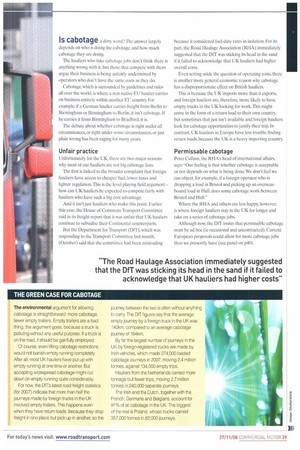THE GREEN CASE FOR CABOTAGE
Page 39

If you've noticed an error in this article please click here to report it so we can fix it.
The environmental argument for allowing cabotage is straightforward: more cabotage, fewer empty trailers. Empty trailers are a bad thing, the argument goes, because a truck is polluting without any useful purpose. If a truck is on the road, it should be gainfully employed.
Of course, even lifting cabotage restrictions would not banish empty running completely. After all, most UK hauliers have put up with empty running at one time or another. But accepting widespread cabotage might cut down on empty running quite considerably.
For now, the DfTS latest road freight statistics (for 2007) indicate that more than half the journeys made by foreign trucks in the UK involved empty trailers. This happens even when they have return loads, because they drop freight in one place but pick up in another, so the journey between the two is often without anything to carry. The DfT figures say that the average empty journey by a foreign truck in the UK was 140km, compared to an average cabotage journey of 184km.
By tar the largest number of journeys 4-ithe UK by foreign-registered trucks are made by Irish vehicles, which made 274,000 loaded cabotage journeys in 2007, moving 2.4 million tonnes, against 134,000 empty trips.
Hauliers from the Netherlands carried more tonnage but fewer trips, moving 2.7 million tonnes in 240,000 separate journeys.
The Irish and the Dutch, together with the French, Germans and Belgians, account for 91% of all cabotage in the UK, The biggest of the rest is Poland, whose trucks carried 357,000 tonnes in 82,00) journeys.




















































































































































